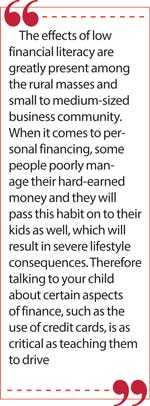Friday Feb 27, 2026
Friday Feb 27, 2026
Wednesday, 2 October 2019 00:00 - - {{hitsCtrl.values.hits}}

What’s financial literacy? Financial literacy is defined as being educated about money and finance. Being financially literate enables you to make smarter money management decisions that directly lead to a financially secure future, one that protects the assets built by you and your loved ones. 
However, low financial literacy among the general public will have an antagonistic impact on overall personal financial security. According to the latest statistical reports, Sri Lanka as a country can take pride in the fact that despite being a developing nation, it was able to achieve a literacy rate of around 92%, making Sri Lanka the most literate country in South Asia. However, it points out that we still have some way to go given the gap between print literacy and finance literacy in the country. This shows that there is more room to promote financial literacy among Sri Lankans.
High print literacy rates do not essentially equate to people being financially astute, but the capability to read and write does provide the base for a person to access and use financial services such as online banking, cheque drafting and ATM use, which all require basic levels of literacy. Therefore a question needs to be asked about why the gap between print literacy and financial literacy is high.
Why financial literacy is as a game changer in the Lankan context
Nobody wants to admit the fact that they are not up to speed on finance and that’s understandable. But if you’re going to get a better handle on your household finances, it’s vital to know and recognise any failings in your financial knowledge and work to eradicate them. You need to know how to make your money work for you and not the other way around. In other words, have the capacity to be a lender and not a borrower.
The following are the ways to become financially literate:
1. By reading
2. By taking a class
3. By talking to a finance professional
We all know that the Internet has given consumers wider access to anything in life, including finance management to purchase any sort of book. Likewise, online financial courses are easy to find on the Internet so you can also benefit from taking an online course. 
There were some incidents where financial institutions attempted to take advantage of those with poor financial literacy and these individuals will always fall into their trap by accepting the risk for higher returns, etc.
Generally, people from all walks of life should be aware of basic principles when it comes to finance and the impact of monetary and fiscal policies. This will not only enhance their personal finance knowledge but will also help them better understand where the country is heading.
Oftentimes, we hear on the news about how public finance mismanagement has caused adverse consequences for future generations, etc. but then again, we need to think through the reasons. It is due to poor financial literacy since people do not possess a strong understanding of the probability of success of some economic decisions made by their elected representatives.
The effects of low financial literacy are greatly present among the rural masses and small to medium-sized business community. When it comes to personal financing, some people poorly manage their hard-earned money and they will pass this habit on to their kids as well, which will result in severe lifestyle consequences. Therefore talking to your child about certain aspects of finance, such as the use of credit cards, is as critical as teaching them to drive.
Many teens are excited about the prospect of getting a credit card, but this is often for the wrong reasons because credit cards and debit cards are identical. Your child may have grown up thinking you have used your credit card for all your purchases. If they begin to rely on their credit card for regular things like the purchase of food then it is a sign of serious financial trouble.
Looking at such things, it will be worthwhile to conduct awareness programs at the grassroots levels so that people are able to grasp the basics of finance as well as prevent others from the danger of financial mismanagement. The public should be aware of things such as duty waivers and other attractive offers or interest rates because due to a lack of financial literacy, people tend to go for such options without clearly viewing the big picture behind these offerings.
Financial literacy’s obstacles and opportunities
Financial literacy is all about understanding how money works, which includes how to generate, invest, spend and save money in ways that safeguard a person’s financial stability. In other words, the ability to perform simple banking tasks, etc. like writing a cheque. In today’s world there are still places where some exchanges take place with cash with limited access to financial institutions but not in Sri Lanka though as we have the opportunity to access such. However, in rural areas more than the access to finance institutions, it may be due to a lack of financial literacy as a result of poor education.
Obstacles
In some areas within the country, there are other barriers to financial education, ranging from a lack of time and resources at public schools to inadequate access to technology, particularly WiFi and financial institutions.
Sometimes it is impossible to use banking apps if one does not have a bank account. Even as new apps offer consumers a way to skip traditional financial interactions like visiting the bank, etc. those consumers are less likely to seek out and use such apps if they are unfamiliar with them and do not have the necessary knowledge. However, children from high-income households are more likely to have used technology at a young age, meaning they are likely to be more technologically literate and therefore likelier to access such apps. What are policymakers to do when confronted by populations with often limited access to certain financial or technological resources and schools that are currently incapable of taking on the additional burden of teaching financial literacy? Sri Lanka’s free education scheme has been the source of national pride for decades. Compared to other developing nations, the free education scheme does not simply mean that there are no school tuition fees charged, but also that any child can succeed academically, regardless of their economic background. However, according to the current structure, the benefit of learning financial knowledge goes to students who sit for the GCE O/L and GCE A/L, therefore it is vital to take action to include a subject like finance as a compulsory module for all other students as well because as citizens we have a role to play in the country’s economy.
Opportunities
Despite these challenges, there are many opportunities to encourage financial literacy. Currently, access to technology has expanded and while special attention should be paid to certain lagging areas to prevent widening inequity, the overall state of technological access creates frequent opportunities for engagement with finance apps, etc. and financial literacy resources.
Meanwhile, schools and districts should partner financial institutions to form mutually beneficial partnerships through which students and parents receive free financial literacy training, and the facilitating partner accesses potential clients. If administered and regulated correctly, such pairings could create mutual relationships that foster micro- and macroeconomic stability within the country.
And while many schools are currently incapable of adding financial literacy to their curriculum, other public institutions may be able to assist in spreading financial literacy and expanding access to financial products.
Some strategies help develop finance literacy among citizens
Government and other financial institutions could provide funding and resources to public schools to incorporate wide-ranging financial literacy curricula from elementary through to high school. These efforts must be broad, but special attention should be given to areas that are already economically marginalised.
Policymakers must also track new developments. Financially literate populations are likely to experience less individual human suffering and are more likely to create the conditions for growth and prosperity. Advocates of economic reform and broader access to opportunity should capitalise on the current political mood and use this moment to advocate financial literacy as an important element of economic, and therefore personal, freedom as well as a means of ensuring sustainable prosperity for all.
Finance literacy and empowerment
Men were shown to have higher levels of financial literacy than women, according to a research study on the financial literacy of the rural community in Sri Lanka conducted by the University of Kelaniya. Women must involve themselves in money management, where financial planning is a key aspect. Financial independence can give a woman confidence; being financially independent means a woman can leave a job to either switch careers or start a business. It allows her to spend more time with her family and raise her children or retire without being dependent on her husband.
Over the last few years, the economic empowerment of women through financial literacy has been a strongly explored area across the world. Financial literacy and positive financial attitude are equally important for both men and women. Women, who are a major part of economy, need to be financially empowered in order to manage their homes and play their part in society and the economy.
In the Sri Lankan context, women are chiefly working in the health, education services, hospitality and leisure sectors. Therefore, women’s role towards the economic empowerment and prosperity of the country is crucial. Hence, there is a great need for economic empowerment through financial literacy, a positive financial attitude and enhanced financial wellbeing of women.
Financial literacy is tied to human rights and considered a basic and fundamental privilege for human beings. In rural areas, this is something to be addressed. Although government institutions such as the Central Bank of Sri Lanka conduct awareness programs, there is still room for improvement with financial literacy programs in rural areas. Perhaps this could not only be done through the Government but also with the help of international organisations and donor funding agencies so that the process could be sped up.
(The writer is a CIMA Cert BA (UK) and holds BA. Business Management degree awarded by Northumbria University (UK). He also served as a Senior Finance Professional at an international development organisation)